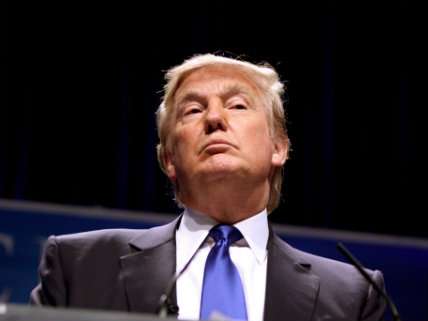Trump's Racist Judge Attack Expands From Mexicans to Muslims
Presumptive GOP nominee's remarks signal that he will continue to channel the racial and cultural resentments that powered his campaign.

Last week, Donald Trump said he didn't think a judge with Mexican heritage should preside over the class action suit against Trump University, because the judge's background presented, in his words, an "absolute conflict" because of his plan to build a southern border wall.
Over the weekend, Trump defended that position, repeatedly insisting to CNN's Jake Tapper that the judge, who was born in Indiana, should be removed because of his "Mexican heritage." And he expanded it, saying that "it's possible, absolutely" that, in his view, a Muslim judge would be similarly conflicted.
Prominent Republicans have condemned Trump's remarks, with Newt Gingrich, who has positioned himself as a potential running mate, calling the remarks "completely unacceptable" and Senate Majority Leader Mitch McConnell saying that he didn't agree with the remarks. Speaker of the House Paul Ryan, who endorsed Trump last Thursday, said too that he "completely" disagreed with Trump's thinking, and described Trump's statements as "just out of left field."
Trump's remarks, however, aren't at all odd or unexpected—for Donald Trump. His primary campaign often channeled racial and cultural resentments. He is simply continuing in the same vein.
Trump opened his campaign last summer by calling immigrants from Mexico "rapists" and criminals, and using the United States as their "dumping ground." He made headlines by proposing a ban on all Muslim immigration to the United States. He refused repeatedly in an interview to disavow the support of former Ku Klux Klan leader and prominent white nationalist David Duke.
The timing of these new remarks—coming after Trump has secured the GOP nomination—suggests that the presumptive Republican nominee has no plans to change his approach during the general election.
As recently as April, Trump's campaign manager, Paul Manafort, had promised otherwise, telling GOP officials in a private meeting that Trump has been playing a part designed to appeal to Republican base in order to win the primary. "That's what's important for you to understand: That he gets it, and that the part he's been playing is evolving." Trump would play a different part during the general election, Manafort said. "The negatives are going to come down, the image is going to change."
Some Republican leaders seem to have believed this. "I think we're much more likely to change him because if he is president, he's going to have to deal with sort of the right-of-center world, which is where most of us are," Sen. Mitch McConnell said last week.
Trump isn't going to alter his rhetoric or his style, because it's not an act. It's central to his character. It's the only way he knows how to campaign, and how to get attention. He's going to continue making racially charged remarks, and continue appealing to the racism and nativism of his supporters.
So, no: Trump's new remarks about the heritage of the judge in the Trump University case aren't coming out of left field. They're a product of the same ugly stew of resentments that has driven much of his campaign so far. They are perfectly in line with his behavior since he started his run. This is who Trump is, and he's not going to change.


Show Comments (343)